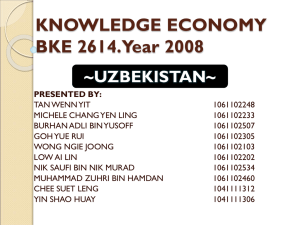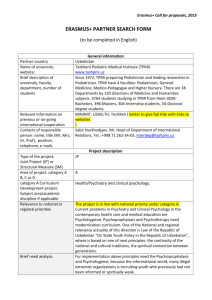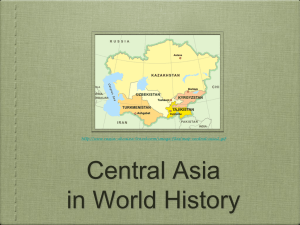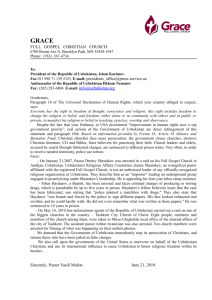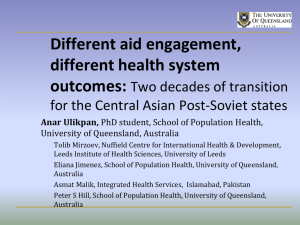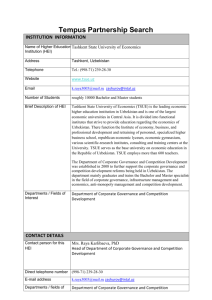CRS Report for Congress Uzbekistan: Recent Developments and U.S. Interests
advertisement
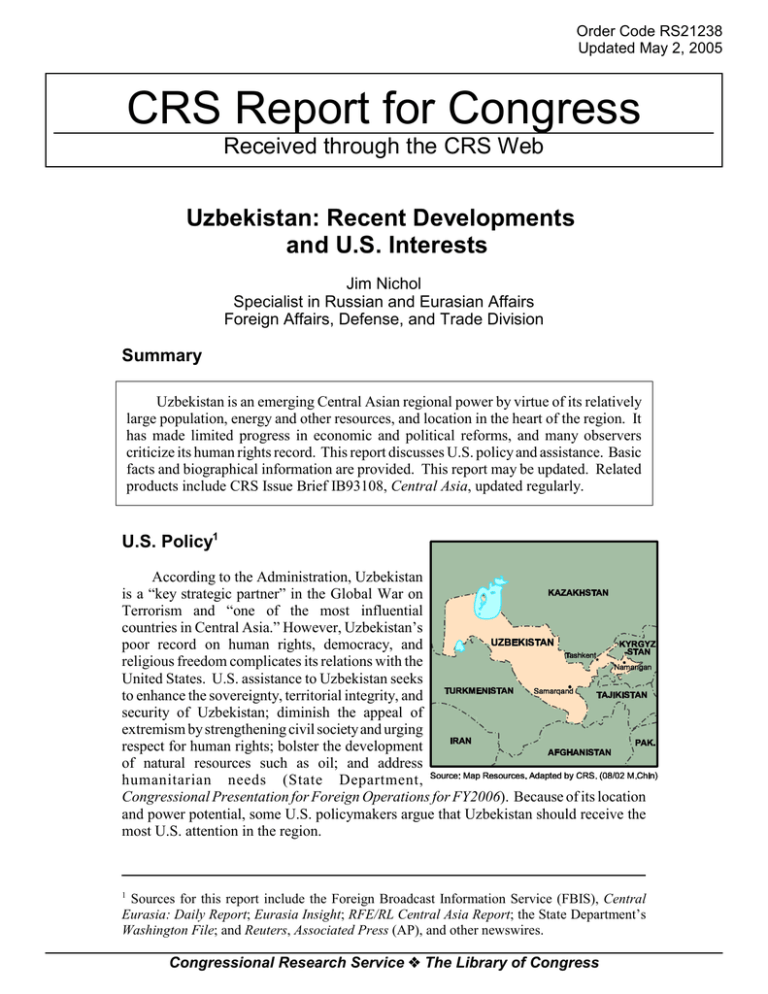
Order Code RS21238 Updated May 2, 2005 CRS Report for Congress Received through the CRS Web Uzbekistan: Recent Developments and U.S. Interests Jim Nichol Specialist in Russian and Eurasian Affairs Foreign Affairs, Defense, and Trade Division Summary Uzbekistan is an emerging Central Asian regional power by virtue of its relatively large population, energy and other resources, and location in the heart of the region. It has made limited progress in economic and political reforms, and many observers criticize its human rights record. This report discusses U.S. policy and assistance. Basic facts and biographical information are provided. This report may be updated. Related products include CRS Issue Brief IB93108, Central Asia, updated regularly. U.S. Policy1 According to the Administration, Uzbekistan is a “key strategic partner” in the Global War on Terrorism and “one of the most influential countries in Central Asia.” However, Uzbekistan’s poor record on human rights, democracy, and religious freedom complicates its relations with the United States. U.S. assistance to Uzbekistan seeks to enhance the sovereignty, territorial integrity, and security of Uzbekistan; diminish the appeal of extremism by strengthening civil society and urging respect for human rights; bolster the development of natural resources such as oil; and address humanitarian needs (State Department, Congressional Presentation for Foreign Operations for FY2006). Because of its location and power potential, some U.S. policymakers argue that Uzbekistan should receive the most U.S. attention in the region. 1 Sources for this report include the Foreign Broadcast Information Service (FBIS), Central Eurasia: Daily Report; Eurasia Insight; RFE/RL Central Asia Report; the State Department’s Washington File; and Reuters, Associated Press (AP), and other newswires. Congressional Research Service ˜ The Library of Congress CRS-2 Cumulative U.S. FREEDOM Basic Facts Support Act and agency humanitarian Area and Population: Land area is 174,486 sq. mi., and technical assistance budgeted for slightly larger than California. The population is 25.1 million (2004 est., Commonwealth of Independent States Uzbekistan in FY1992-FY2004 was Statistics Committee). Administrative subdivisions include $646.0 million (by comparison, EU the Karakalpak Republic. grants and loans amounted to about Ethnicity: 80% are Uzbek, 5.5% Russian, 5% Tajik, 3% $159 million). For FY2005, $48.7 Kazakh, 2.5% Karakalpak, 1.5% Tatar, and others (2003 CIA Factbook, 1996 est.). Uzbeks are the most numerous million is planned for Uzbekistan, Central Asian nationality. There are more than 1.2 million and the Administration has requested Uzbeks residing in Afghanistan, one million in Tajikistan, $37.4 million for FY2006 and a half-million in Kyrgyzstan. (FREEDOM Support Act and other Gross Domestic Product: $11.9 billion in 2004; per foreign aid, excluding Defense and capita GDP is about $474 (Uzbek State Statistics En ergy Department funds ). Committee est., current prices). Political Leaders: President: Islam Karimov; Prime Bolstering the Uzbek military’s Minister: Shavkat Mirziyoyev; Speaker of the Legislative capabilities to combat terrorism and Chamber: Erkin Xalilov; Speaker of the Senate: Murod trafficking in weapons, persons, and Sharifxojayev; Foreign Minister: Elyor Ganiyev; Defense narcotics “will contribute immensely Minister: Qodir Ghulomov Biography: Karimov, born in 1938, in 1983 became to U.S. interests and regional Uzbek Minister of Finance, and then Deputy Chairman of security” (Congressional the Uzbek Council of Ministers. In 1989, he became First Presentation). Foreign Military Secretary of the Uzbek Communist Party. In 1990, the Financing (FMF) is proposed for Uzbek Supreme Soviet elected him to the newly created post of President, and he also became a member of the communications and other equipment useful for border control and river Soviet Communist Party Politburo. In December 1991, he was popularly elected President, winning 86% of the vote patrols and to support programs for against opposition Erk Party candidate Mohammed Solikh. non-commissioned officers (NCOs). In 1995, Karimov orchestrated a popular referendum to International Military Education and extend his presidency until 2000, won re-election, and in 2002 orchestrated another to extend his term until 2007. Training (IMET) funds is proposed to support the development of an NCO corps and for mountain training, infantry training, special forces training, border security training, civil-military relations, and emergency and disaster response. Funds for regional Science Centers and BioChemical Redirect programs are proposed to retrain scientists to engage in research on arid land agriculture, seed crop development, water quality, and human and animal health. Law enforcement assistance is proposed to support Uzbek police cooperation with the U.S. Drug Enforcement Administration and to improve the treatment of suspects and prisoners and end the use of torture. Because political reform is lagging, FY2006 aid is proposed for promoting human rights, assisting the development of independent political parties, supporting independent television and radio stations and non-governmental organizations (NGOs), and fostering an independent judiciary and legal corps. Besides bilateral aid, the United States also contributes to international and non-governmental organizations that aid Uzbekistan. Concerns about WMD proliferation led the Administration at the end of 2003 to waive restrictions on most anti-terrorism aid to Uzbekistan under authority provided by the National Defense Authorization Act for FY2003 (P.L.107-314). The Administration indicated that Uzbekistan had not satisfied Congressional requirements to respect human rights, as contained in Sec.1203(d)(6) of the Cooperative Threat Reduction (CTR) Act of 1993 (P.L.103-160), making the waiver necessary. The waiver authority was exercised again on December 14, 2004 for FY2005 funding. CRS-3 Since FY2003, Congress also has prohibited FREEDOM Support Act assistance to the central government of Uzbekistan unless the Secretary of State determines and reports that Uzbekistan is making substantial progress in meeting commitments to respect human rights, establish a multiparty system, and ensure free and fair elections, freedom of expression, and the independence of the media (P.L.108-7; P.L.108-199; P.L. 108-447). Congress received a determination of progress in FY2003. In July 2004, State Department spokesman Richard Boucher announced that some FY2004 military and economic aid to Uzbekistan would be withheld because of “lack of progress on democratic reform and restrictions put on U.S. assistance partners.” IMET and FMF programs — which are conditioned on respect for human rights — were among those affected. Ultimately, reprogramming and the use of notwithstanding authority resulted in about $8.5 million being withheld. Some aid may be similarly withheld in FY2005. The Chairman of the Joint Chiefs of Staff, Gen. Richard Myers, during an August 2004 visit to Uzbekistan, criticized the cutoff of IMET and FMF programs as “shortsighted” and not “productive,” since it reduced U.S. military influence. Reportedly, he announced boosted nonproliferation aid of $21 million and the transfer of fourteen patrol boats worth $2.9 million, perhaps to reassure the Uzbeks of U.S. interest in their security. Contributions to the Campaign Against Terrorism In her testimony on April 8, 2004, to the Commission on Terrorist Attacks Upon the United States, then-National Security Advisor Condoleezza Rice emphasized that early Administration efforts to counter global terrorism — before the September 11, 2001, terrorist attacks on the United States — included increasing cooperation with Uzbekistan. These ties proved useful in soliciting Uzbek support for Operation Enduring Freedom (OEF) in Afghanistan. A formal agreement on U.S. use of the Khanabad airbase, near the town of Karshi (termed the K2 base) was signed on October 7, and a joint statement pledged the two sides to consult in the event of a threat to Uzbekistan’s security and territorial integrity. In March 2002, the two sides signed a “Strategic Partnership” accord that reiterated this nonspecific security guarantee to consult “on an urgent basis.” The United States also pledged military aid, and Uzbekistan pledged to “intensify democratic transformation” and increase media freedom. In early 2003, Uzbekistan was the only Central Asian state that joined the “coalition of the willing” that endorsed prospective U.S.-led coalition military operations in Iraq, but Karimov balked at sending troops. Uzbekistan has benefitted from its alliance with the United States. In addition to security assurances and increased military and other aid, U.S. forces have helped eliminate much of the Islamic Movement of Uzbekistan (IMU; a terrorist group based in Afghanistan and dedicated to the forceful establishment of Islamic rule in Uzbekistan). Not only were IMU bases destroyed in Afghanistan, but IMU military leader Juma Namanganiy was reportedly killed. Foreign Policy and Defense Home to more than half the population of Central Asia, Uzbekistan seeks to play a leading role in regional affairs. Karimov’s priority in foreign policy has been to seek closer security ties with the United States, while maintaining working relations with Russia that do not overly compromise its independence. Uzbekistan, Russia, Armenia, and other Central Asian states signed a Collective Security Treaty in 1992 which calls for CRS-4 mutual assistance in the case of aggression against the parties. Uzbekistan withdrew from this pact in 1999, citing sovereignty issues. In 2001, Uzbekistan joined the Shanghai Cooperation Organization (SCO; other members are China, Russia, Kazakhstan, Kyrgyzstan, and Tajikistan) and in 2003 insisted on hosting the SCO Regional AntiTerrorism Center. In April 2004, he criticized SCO members for failing to aid Uzbekistan during the March-April 2004 attacks and concluded that Uzbekistan should “rely on its own power.” Uzbekistan has ongoing tensions with other Central Asian states. In 1998, the Tajik president accused Uzbekistan of supporting an uprising in northern Tajikistan, and in 2002, the Turkmen government accused Uzbek officials of conspiring to overthrow it. To safeguard its borders from terrorism, Uzbekistan mined its borders with Tajikistan and Kyrgyzstan in 1999, causing grievances. The Uzbek military is the most advanced among those of the Central Asian states. The armed forces consist of 50-55,000 troops in ground and air forces. There are also 1719,000 internal security (police) troops and 1,000 national guard troops (The Military Balance 2004-2005). Physicist Qodir Ghulomov is the first civilian defense minister in the CIS. Uzbekistan’s military doctrine proclaims that it makes no territorial claims on other states and adheres to nuclear non-proliferation. Military cooperation between Russia and Uzbekistan is ensured through a 1992 Friendship Treaty, a 1994 military treaty, and a 1999 accord on combating terrorism and Islamic extremism, though in recent years Uzbekistan has worked to build up its own defenses, industries, and schools. Uzbekistan also has played an active role in NATO’s Partnership for Peace (PFP) since 1994 by participating in military exercises and training, including in the United States. On February 16, 1999, six bomb blasts in Tashkent’s governmental area by various reports killed 16-28 and wounded 100-351. In response, the government arrested dozens of suspects, including political dissidents. The motives for the bombing remain murky, but Karimov termed them an assassination attempt. He alleged that exiled Erk Party leader Mohammad Solikh led the plot, assisted by Afghanistan’s Taliban and IMU coleader Tahir Yuldashev. Solikh denied any role in the bombings. In November 2000, Yuldashev and Namanganiy received death sentences and Solikh 15.5 years in prison (all in absentia). Another defendant tried in absentia, Najmiddin Jalolov (see below), received 18 years. Other security threats included the invasion of neighboring Kyrgyzstan in July-August 1999 by several hundred IMU and other Islamic extremists. They were rumored to be seeking to create an Islamic state in south Kyrgyzstan as a springboard for a jihad in Uzbekistan. By mid-October 1999, they had been forced out of Kyrgyzstan. Uzbekistan assisted with air strikes, border troops, and materiel. The next August, dozens of IMU and other guerrillas again invaded Kyrgyzstan and Uzbekistan, but were expelled by late October. In September 2000, the State Department designated the IMU as a Foreign Terrorist Organization, stating that the IMU actively threatens U.S. interests and attacks American citizens, and stressing that the “United States supports the right of Uzbekistan to defend [itself against] the violent actions of the IMU.” A series of bombings and armed attacks began in Uzbekistan on March 28, 2004, and continued through April 1, reportedly killing 47 individuals. President Karimov asserted that the attacks were aimed against his government to “cause panic among our people, [and] to make them lose their trust.” U.S. Air Force Secretary James Roche and Lt. Gen. David Barno, Combined Forces Commander for Afghanistan, visited Uzbekistan in April 2004, with Barno stressing that “we stand with Uzbekistan in facing down this terrorist menace.” An obscure Islamic Jihad Group of Uzbekistan (IJG; Jama’at al-Jihad al-Islami, CRS-5 reportedly an alias of the IMU) claimed responsibility for the violence. Fifteen suspects (all of whom confessed their guilt) were sentenced in late August 2004 to 11-16 years in prison. Some of them testified that Jalolov was the leader of IJG, that they were trained by Arabs and others at camps in Kazakhstan and Pakistan, and that the IJG was linked to Hizb ut-Tahrir, the Taliban, Uighur extremists, and Al Qaeda. During this trial, explosions occurred in Tashkent on July 30, 2004, at the U.S. and Israeli embassies and the Uzbek Prosecutor-General’s Office. The IMU and IJG claimed responsibility and stated that the bombings were aimed against the trial and “apostate” governments. U.S. concerns about the ongoing attacks include increased instability that could affect the security and future of K2, reduce coalition access to Afghanistan by air or ground, and heighten the danger of trafficking in WMD technology and know-how. Political and Economic Developments In January 2005, Karimov proclaimed that he backed the creation of three powerful branches of government, to correct a situation where “everything now depends on me.” He explained that “I simply had to take on all of the responsibility” of governing Uzbekistan after the collapse of the Soviet Union, but that in the future, a strong legislature and judiciary would prevent dictatorship. In January 2002, Karimov orchestrated a constitutional referendum to create a bicameral legislature, termed the Oliy Majlis (Supreme Assembly) and to extend his term to seven years. In April 2002, Karimov introduced legislation to set up a 120-member, directly-elected lower chamber, the Legislative Chamber, and a 100-member upper chamber, the Senate. He proposed that the Senate be composed of 16 members he would appoint, with the rest selected by 14 local legislatures. He proposed that the lower chamber have most of the responsibility for drafting laws and, in December 2002, called for the Senate to have the power to confirm the prime minister and other top officials, arguing that this would keep a future president from grasping for absolute power. Constitutional amendments approved in April 2003 established that — after the next presidential election — the prime minister ostensibly would exercise greater power. A law approved in April 2003 provides expresidents with immunity from prosecution, a legislative seat, and a pension criticized by some Uzbeks as extravagant. In December 2004, Karimov stated that “the OSCE should not artificially try to create [opposition] that does not exist” among the citizenry. Only pro-Karimov parties operate legally: the Popular Democratic Party (PDP), founded by Karimov; the Fidokorlar (Self-Sacrifice) National Democracy Party, created by Karimov as a youth party; the Adolat (Justice) Social Democratic Party; the Liberal-Democratic Party, consisting of government-connected businessmen; and the National Revival Party, consisting of statesupported intellectuals. Since 2003, the government has permitted the banned opposition parties Birlik (Unity), Erk (Will), and Ozod Dehqonlar (Free Farmers; formed in late 2003) to hold meetings but repeatedly has found fault with their bids to obtain legal status. In January 2005, Karimov suggested that the PDP call itself an “opposition” party. The last presidential race was in January 2000. The two candidates were incumbent President Karimov and Abdulkhafiz Jalolov. Jalolov was nominated by the PDP — which he headed after Karimov resigned as head in 1996 — to give the appearance of a contest. Jalolov endorsed Karimov during the campaign. Karimov won 91.9% of 12.1 million votes cast. The State Department concluded that “this election was neither free nor fair.” The next presidential election is scheduled for 2007. CRS-6 In the run-up to the December 26, 2004, Legislative Chamber elections, the government restricted freedom of speech and assembly. In February 2004, the government decreed that foreign grants to non-governmental organizations (NGOs) had to be administered by the government. It also accused the National Democratic Institute (NDI), International Republican Institute (IRI), and Freedom House of engaging in subversion, prompting the State Department to call for the unhindered operation of groups assisting Uzbekistan to carry out its commitments under the 2002 Strategic Partnership Agreement. A limited OSCE observer mission concluded that the December 2004 legislative race “fell significantly short of ... international standards for democratic elections.” It also stated that “the relevant principles necessary for a meaningful democratic election process, such as freedom of expression, association and assembly, were not respected.” Members of parties not allowed to participate attempted to form dozens of citizens’ groups to register candidates, but government officials found fault with these registration attempts, according to the OSCE. The lack of open information about the race contributed to low public interest and in less than a 50% turnout in half the districts, triggering required run-offs on January 9, 2005. Two weeks later, local legislatures, overseen by members of the Central Electoral Commission, selected members of the Senate. The State Department’s Country Reports on Human Rights Practices for 2004 reported that Uzbekistan’s human rights remained very poor and it continued to commit numerous serious abuses. The government took some steps to address torture and to establish police accountability but made no progress on democratic reform and increased harassment of NGOs and media. Police and security forces tortured, beat, and harassed persons, including religious extremists, human rights activists, and political dissidents, but allowed international human rights groups to investigate alleged deaths in custody. Prison conditions generally remained poor, although there were limited improvements in some prisons. The number of persons in prison for political or religious reasons was estimated to be between 5,000 and 5,500. The government severely restricted freedom of speech and the press and continued to prohibit unauthorized public meetings and demonstrations. Police forcibly disrupted several peaceful protests, although fewer than in previous years. In early 2005, the government closed down IRI. Indicative of rising discontent, hundreds rioted in a town in Uzbekistan in April 2005, protesting against increasing political, economic, and religious repression. During the 1990s, President Karimov maintained a high degree of state ownership of production, subsidized some basic goods and services, and put restrictions on trade and currency conversion. The economy began to turn around in 1996, but growth remains sluggish. Uzbekistan in 2003 finally permitted its currency to be freely convertible but vitiated the reform by reducing money in circulation, closing borders, and placing punitive tariffs on imports. These restrictions have fueled organized crime, corruption, consumer shortages, unemployment, and wage arrears. The World Bank reports that the quality of life for most of the population has improved little or deteriorated in terms of healthcare, education, housing, and income. Uzbekistan is the world’s fifth largest cotton producer, and about 30% of the country’s economic activity is based on agriculture. The government closely controls this sector. The European Bank for Reconstruction and Development announced in 2004 that it would sharply limit its lending to Uzbekistan, citing the country’s failure to register opposition parties, the continuing torture of prisoners, media restrictions, and inadequate payments to cotton producers and laborers.
